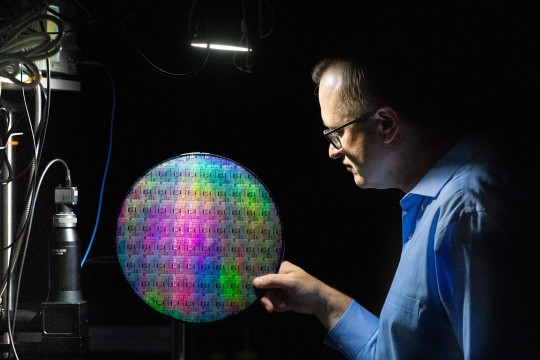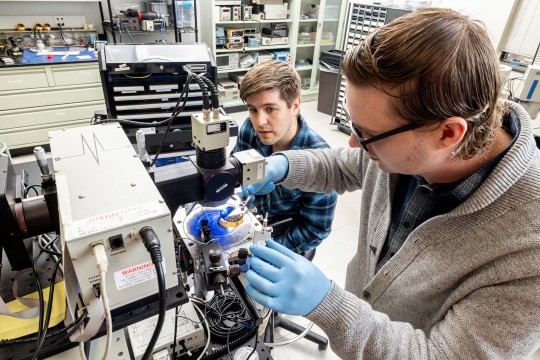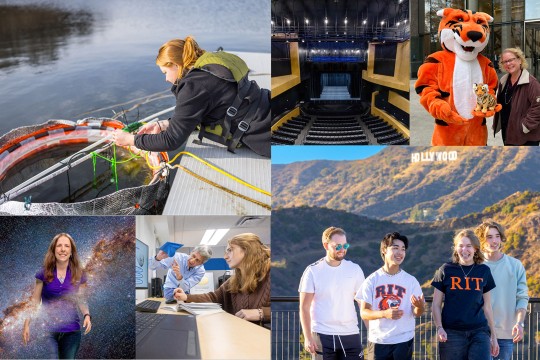Research News
- RIT/
- College of Engineering/
- Research/
- Research News
-
February 12, 2026

RIT, URochester to receive $2 million to advance quantum communication network
RIT and the University of Rochester will receive $2 million in federal funding to further develop the Rochester Quantum Network (RoQNET). The National Institute of Standards and Technology is providing the funding to advance the future of secure quantum communications and to build new capabilities for RoQNET.
-
December 19, 2025

University launches multidisciplinary training program to strengthen the U.S. semiconductor workforce
RIT has launched CMOS+X, a National Science Foundation Research Traineeship program that prepares future STEM leaders with professional skills training, including interdisciplinary collaboration, scientific writing, strategic communication, and project management skills.
-
December 15, 2025

Top stories that shaped RIT in 2025
As 2025 comes to a close, we’re reflecting on a year filled with milestones, innovation, and inspiring stories from across the RIT community.
-
December 3, 2025

Opening of new Research Building will position RIT at the ‘forefront of discovery’
RIT’s new Research Building officially opened its doors Dec. 2, and inside, faculty and students are gearing up to usher in a new era of discovery on campus.
-
December 1, 2025

Study details how analog computing solves signal processing challenges faster
Researchers at RIT have improved the electronics used in communication and radar systems to better process signals using electromagnetic radio waves. This breakthrough could advance computing processes for technologies that need to handle signals quickly and efficiently.
-
November 24, 2025

RIT partners with Gallaudet University to launch research traineeship program in Universal AI
RIT is teaming up with Gallaudet University to prepare the next generation of artificial intelligence researchers and practitioners who will develop AI for everyone.
-
November 21, 2025

Engineering researcher appointed new director of RIT’s NanoPower Research Laboratory
Engineering researcher Stephen Polly was recently appointed director of the RIT NanoPower Research Laboratory and will lead one of the university’s major research groups.
-
November 19, 2025

Venture Creations startup company is redefining breast cancer detection
BiRed Imaging, co-founded by Professor Satish Kandlikar, blends infrared camera capture, numerical simulation, and artificial intelligence-driven algorithms to accurately detect the presence, size, and location of tumors. The revolutionary process spares patients painful breast compression, radiation exposure, false alarms, and unnecessary anxiety.
-
November 19, 2025

Manifesting quantum: How RIT researchers are navigating the next frontier of physics
RIT researchers are zeroing in on quantum photonics, the creation, control, and detection of light. Photonics has long been a specialty of the university. RIT led the team that developed the first quantum photonic wafer, which is key to the future of mass-produced quantum communication systems.
-
September 19, 2025

RIT, partners named finalist for funding to bolster region’s laser expertise
A Rochester and Finger Lakes region coalition that includes researchers from RIT has been named a finalist for the National Science Foundation’s Regional Innovation Engines (NSF Engines) program.
-
September 8, 2025

RIT sets record for sponsored research funding
RIT is celebrating a record year for sponsored research funding in fiscal year 2025, receiving $105 million.
-
August 27, 2025

Mechanical engineering faculty member earns prestigious CAREER award
Faculty-researcher Rui Liu was recently awarded a National Science Foundation CAREER award to lead a collaborative effort throughout the Finger Lakes to further the advanced manufacturing workforce.


